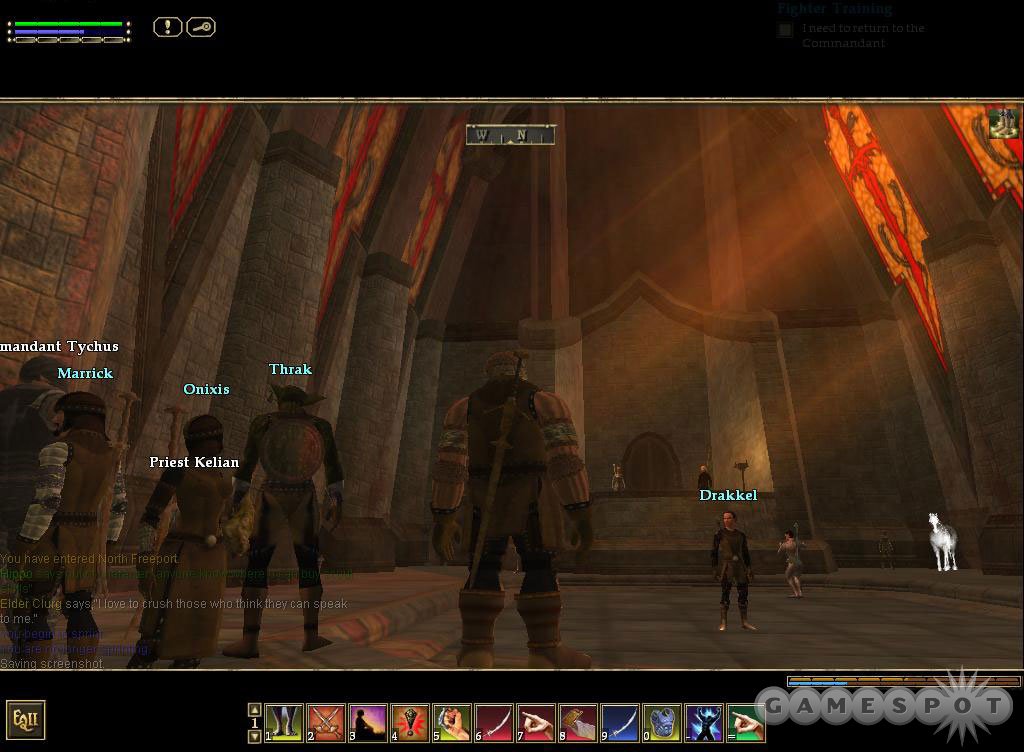EverQuest wasn't the first game of its kind when it was released in 1999, but it was the best, and remained the best for a long time. Along with Ultima Online, it deserves credit for popularizing the massively multiplayer online role-playing genre, and it's still widely played to this day. As a result, the inevitable EverQuest II has some seriously big shoes to fill. And it almost does. In many ways, this new game embodies almost all the numerous refinements and evolutions that the genre has undergone in the past five years, so it's one of the most instantly gratifying and accessible online RPGs yet. It also sports a rather impressive presentation, thanks largely to an ambitious effort to make almost all the game's non-player characters communicate using full speech. Yet when you get right down to it, EverQuest II really isn't that different from the numerous other games of its type, and its mostly great visuals are offset by subpar technical performance. So while EverQuest II isn't the massive step for the genre that its predecessor was, it can still be a fun and addictive online role-playing experience that has a lot to offer new and experienced players alike.
It's worth noting right up front that EverQuest II launched in a solid state. It offered a wide breadth of content and some obvious depth from the day of release, which really should be nothing to boast about, but then again, we're talking about a genre that's historically taken a "ship it now and fix it later" approach. As such, unlike a lot of other, lesser online RPGs, EverQuest II clearly has a good amount of original content for you to spend many hours exploring. At least for the first several dozen hours, it always gives you something to do, generally doing a good job of keeping you engaged, if not addicted. The game picks its battles, though. Unlike many other online RPGs, EverQuest II is purely focused on player vs. environment gameplay, so there's no player vs. player combat in the game whatsoever. This is a surprising omission, especially considering that the structure of the game seems like an obvious setup for some PvP action, since all players are forced to swear allegiance to the forces of good or the forces of evil. For comparison's sake, the original EverQuest did include player vs. player combat, as well as the ability to harmlessly duel with other players (that much, at least, would have been nice here), but EverQuest's focus has always been on cooperative instead of competitive play.
In exchange, EverQuest II offers a fairly complex and entertaining combat system, a similarly interesting system of "tradeskills," the ability to sublet and furnish your own dwelling in the gameworld (complete with the pleasures of having to pay rent), and a pretty impressive guild system that lets player guilds indirectly compete for prominence. Like the original, EverQuest II's world consists of numerous discrete adventure zones that, also like the original, are separated by some lengthy loading times. The game does a fairly good job of letting you get your bearings in each new area, thanks to an onscreen compass, a pop-up map of your surroundings, and a journal that automatically keeps track of the quests you've undertaken. EverQuest II also alleviates the tedious downtimes that were a notorious part of the original game, so even if you're fighting solo, it's possible to recover your health and power (used for spells and special abilities) fairly quickly in between fights. As a result of all this, EverQuest II is more conducive to relatively short play sessions than a lot of other online RPGs, but it's still a game that will happily swallow up all your spare hours, and really demands to be played for at least several hours at a time for satisfying results.
The world of EverQuest II is the very same Norrath featured in the original game, but it's a Norrath that's been stricken by a cataclysmic event that caused most of the world's civilization to collapse. As a result, only two main metropolises remain: Qeynos, home of the forces of good, and Freeport, bastion of the forces of evil. When creating your character, you must choose your alignment--good or evil--although some character races are limited to just one or the other. At any rate, this choice determines your starting city (you can change allegiances later by undertaking a special "betrayal quest"), and in turn, the locations in which you'll inevitably be spending most of your first several dozen hours of play. The two main cities are superficially quite different: The polite citizens of Qeynos traipse along streets lined with Victorian-style buildings, while Freeport's surly population fits right in with its cruel, inhospitable architecture. However, each city is equally large and equally diverse, and offers similar amenities and analogous quests. It's interesting to see how things are on both sides of the fence, but don't expect the good and evil experiences in EverQuest II to be drastically different from a gameplay standpoint.
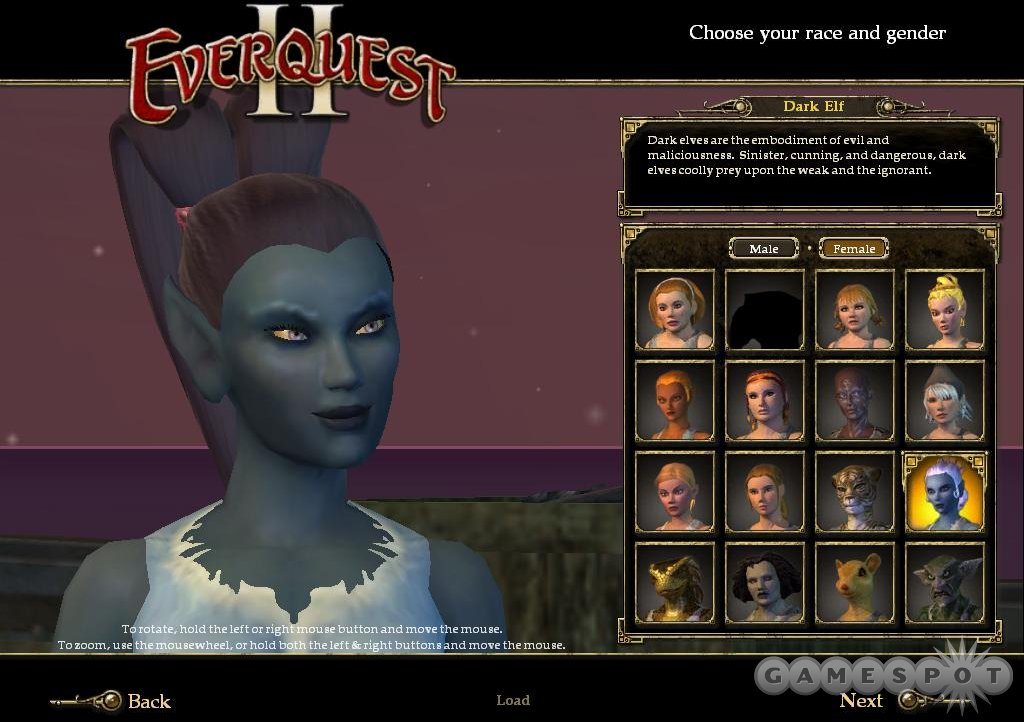
All of EverQuest's numerous character races are once again present here, including the smaller ones like dwarves and gnomes; the boring old medium-size ones like humans and half-elves; and the bigger, brawnier ones like barbarians and ogres. The reptilian iksar and feline kerran are also present, along with a new race of bipedal rodents called the ratonga. EverQuest's frogloks are still hopping around in Norrath, too, but are initially not selectable as a player race, for whatever reason. Still, there's a broad, colorful selection of different possibilities here, and for each different race, you can play as a male or female version and also customize your character's hairstyle and facial features. The character-creation process doesn't give you too much freedom to significantly differentiate your appearance from that of other characters of the same race and gender, but it's still fun to mess around with. While you're limited to a maximum of four characters per account, you'll inevitably want to try out a variety of different character types to find the one whose style best suits you. But don't expect anything drastic here, either, even when switching from a tiny halfling to a hulking troll. Like in the original EverQuest, the differences between races seem mostly superficial, notwithstanding some minor race-specific abilities and ability-score distributions.
The game opens with an optional interactive tutorial that does a great job of teaching you the basics, even if you're already well acquainted with such games. After this brief adventure, which takes place at sea, you'll land on the Isle of Refuge, which just so happens to be a perfect place for newbie players to cut their teeth on EverQuest II's combat, tradeskill, and questing elements. You're free to leave the isle at any time, but you can gain some valuable items and experience by sticking around and exploring for a while. Eventually, the quests here pretty much require you to team up with other players to succeed, so the isle serves as a great introduction to the virtues of working as a team instead of going at it solo. With that said, one of the nice things about EverQuest II compared with its predecessor is that it lets most types of characters more viably fight and explore solo, at least throughout the initial stages of the character's life.
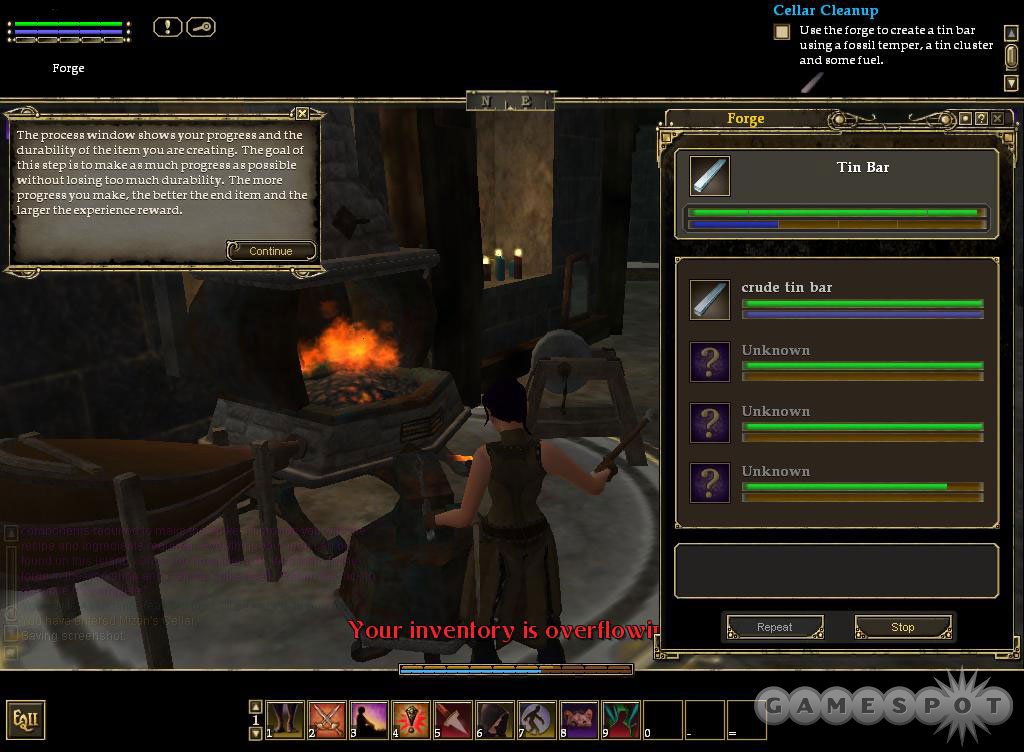
However, before you get to your adventuring, you need to pick a profession. EverQuest II actually features about two dozen different character classes, but to make things easier on you, it'll initially let you choose from just four: fighter, scout, mage, or priest. Unlike in EverQuest, any combination of races and classes is possible, so if you want to be an ogre mage, you can. After you've made your choice, you'll be able to choose one of several specialized classes at around level 10 (after undergoing a series of quests), and then one of a couple of different subclasses at level 20 (ditto). For example, a fighter can evolve into a warrior, a brawler, or a crusader, and if you become a brawler, then you can later become a bruiser or a monk. Neither the game's manual nor the game itself does a particularly good job of explaining what the differences are between the specialized classes and subclasses, but the differences tend to be at least slightly intuitive. Nevertheless, you need to choose very carefully when decision time comes: Your choice is final, and will determine which sorts of responsibilities your character will have in a group, and how viable your character will be if left to his or her own devices. At any rate, there's certainly a wide variety of different classes, and each of the four main archetypes seems powerful, useful, and interesting in its own right.
EverQuest II is briskly paced at first, but it slows down considerably around the time you earn your specialty class. There's currently an experience-level limit of 50, and after a little more than a week, some hardcore players are already about halfway there (though the second half is going to be much slower going, of course). Since there's no PvP component to aspire to, what's to be expected from EverQuest II's high-level game? The answer is, if anything, probably a lot of guild-specific agendas. Forming a guild in EverQuest II is a pretty simple process that requires you to come up with six or more like-minded players and a reasonable sum of gold. Once you've formed or joined a guild, you'll notice that the guild itself can gain experience levels, which happens as its members complete the tasks requested of them in writs they can receive from the town herald. Since all online RPGs implicitly encourage players to "race" through the levels, becoming stronger as quickly as possible so they can be the envy of everyone else, the writ system seems like a good way to bring this undeniable dynamic to a team-based level. So, even though there's no PvP, there's still going to be a sense of competition between guilds, who'll need to expand their numbers and keep accomplishing tasks so they can earn more status points, which they can spend on special rewards that increase the guild's prestige within its city. The game also features some good tools for guild management, including integration with a Web site that lets you automatically keep track of what's happening with your guild. For what it's worth, EverQuest II also seems to do a good job of keeping its economy stable and balanced. For example, lower-level characters simply cannot take advantage of hand-me-down high-level equipment. 
Combat in EverQuest II closely resembles what's been done by some earlier rivals to EverQuest, such as Dark Age of Camelot and Final Fantasy XI. Fundamentally, it's still a lot like EverQuest in that you target an enemy and initiate your auto-attack, which causes you and the foe to exchange hits until one of you dies or flees. However, combat becomes an active experience thanks to the presence of so many different spells and special abilities for each character class. Even the game's warrior-type classes, which are relatively simplistic in EverQuest, have lots of unique powers. So you'll whale on your foe while unleashing a torrent of debilitating attacks and defensive maneuvers. Furthermore, certain types of moves initiate what are called "heroic opportunities," which are basically combos of special moves. If you and your party members string together a proper sequence of actions, you'll trigger some kind of beneficial effect, such a temporary boost in your attack speed or power. Heroic opportunities require no real timing, but reward basic coordination within groups and help make the combat slightly more involved than is typical of the genre. Fighting in groups can get pretty hectic, though, as damage numbers clutter the screen and the text window, making it difficult to tell what's going on from moment to moment. Nevertheless, a clear, fairly uncluttered interface lets you easily keep tabs on how your allies are doing.
The foes you'll be fighting against include many EverQuest mainstays, along with some new creations. Early on, you'll once again be dealing with ignoble critters like rats, snakes, bugs, and spiders, but you'll eventually graduate to fighting bigger and tougher foes. The game does a good job of giving you an at-a-glance indication of which creatures will be immediately hostile to you and which creatures will ignore you, and it also gives you a decent assessment of a foe's relative strength. In a nice touch, EverQuest II also lets creatures group together. Sometimes you'll encounter monster groups, which yield experience bonuses when defeated, and which tend to be impossible for individual players of similar experience level to overcome. So if you prefer playing solo, you'll need to be on the lookout for monsters that don't like company, either. Your foes' artificial intelligence is typical of the genre. They'll automatically target the physically weaker characters in your party, unless the stronger characters manage to hurt them or taunt them enough to draw their attention. If you're getting hammered by a foe, it's possible to sprint away to safety.
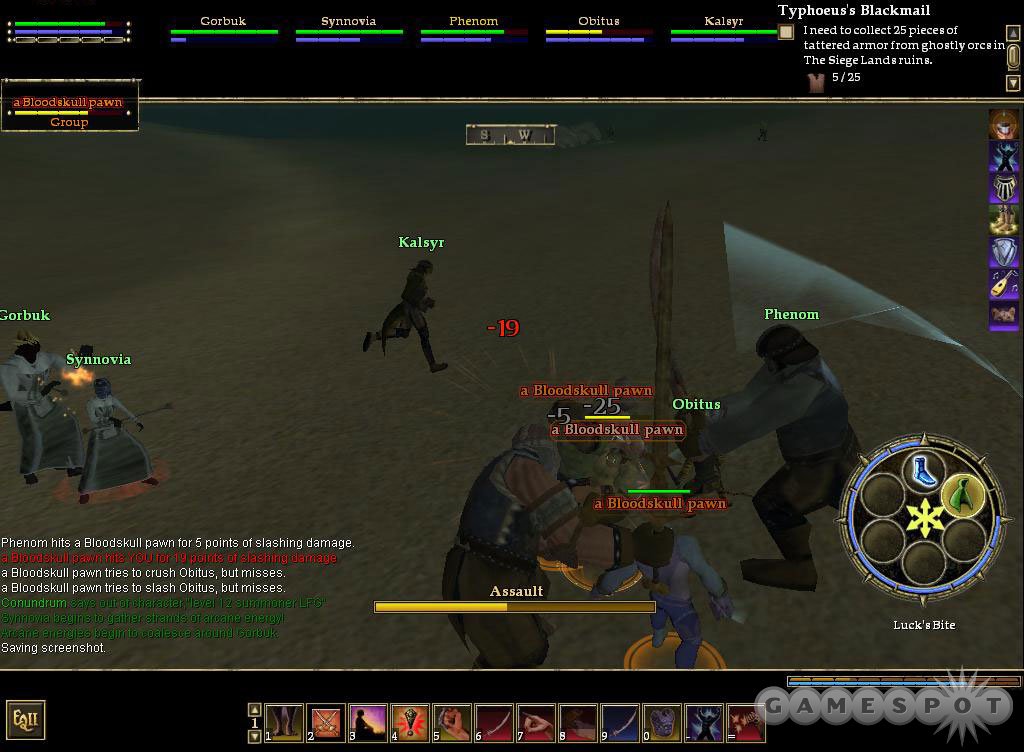
Death is a part of life in any online RPG, and EverQuest II handles it in a now-traditional fashion, by making death annoyingly undesirable but not so much the soul-crushing affair that it often was in the original EverQuest, where dying meant potentially losing all your hard-earned belongings, or spending hours trying to hunt them down. When you die in EverQuest II, you incur "experience debt" and all your equipment loses durability (which can be restored for a fee by an NPC mender character). You also suffer a temporary penalty to your ability scores. However, you leave behind a ghost, or "soul shard," and if you trek back to the scene of your demise, you can recover this shard and mitigate many of the penalties incurred upon death. This system works well--it makes you not want to die, but also not want to delete your character in despair if you do. Incidentally, EverQuest II makes it easy to find your soul shard, thanks to a glowing waypoint that'll guide you straight to its location. These waypoints are used to plot you a course from point A to point B for some of the game's easier quests, but don't expect to have your hand held like this for long. EverQuest has always been a game about exploration, and having to rely upon fellow players to help steer you in the right direction, and this is also true of the sequel.
If you prefer a less violent way to pass the time in Norrath, there's always the tradeskill system to fall back on. There are three different types of tradeskill professions (craftsman, outfitter, and scholar), each of which has several of its own specializations. You choose from these independently of your adventure class, and you gain experience in tradeskills separately from your adventure experience, too. You even earn "tradeskill arts" as you level up, which are special abilities akin to your spells and combat skills. They help make the actual process of crafting stuff and leveling up rather more exciting than what's typical of online RPGs. Yet while tradeskills and adventuring are not directly linked, to find the best crafting ingredients you'll invariably need to venture out into the wilderness and scavenge for them. Crafting items, from baked goods to weapons to magic scrolls, requires you to first locate the necessary ingredients, and then use the appropriate device (a forge or a chemistry desk, for example) to create the desired item. Of course, you need to know the right formula first. There's obvious demand for player-crafted goods in EverQuest II--for example, players can create better versions of skill scrolls. You'll learn the basic form of a new skill just by raising your experience level, and you could then buy a slightly improved version of that skill, but a player-made scroll will make your powers even more efficient. At any rate, fans of crafting in online RPGs should find plenty to like here.
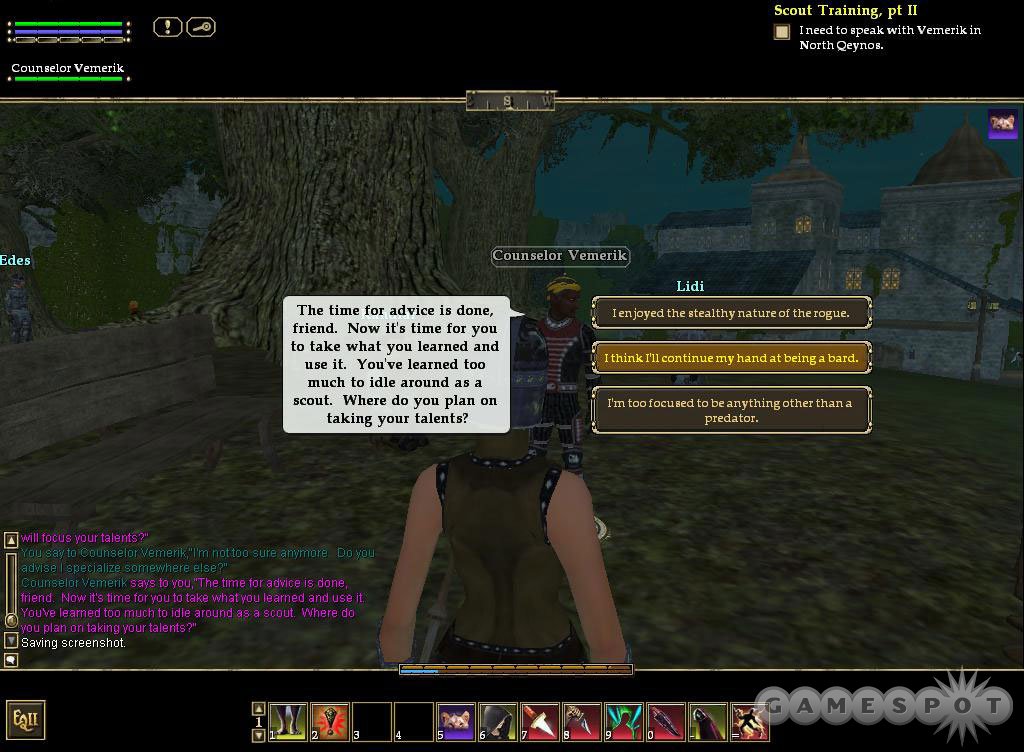
The presence of lots and lots of different quests is one of the most noticeable differences between the original EverQuest and the sequel. In the original, many players would almost completely avoid questing (at least until higher levels), since the best way to level up often involved simply hunkering down and fighting lots of monsters. In EverQuest II, you can often kill two (or more) birds with one stone if you talk to the various NPCs in each zone. Chances are one of them will charge you with weeding out a bunch of local critters, which you'd be inclined to do anyway, so you might as well do it for a bonus in experience and cash. Of course, EverQuest II's quests don't just revolve around killing stuff--some are fetch quests, some require you to seek out certain areas, and so forth. Most of the quests aren't terribly original or provocative, but there are definitely a lot of them, and it's easy to rack up several dozen different pending quests at a time.
While it's great to have this much stuff to do, you'll also notice that EverQuest II's journal feature could be markedly better. It lets you sort all your pending quests based on the adventure zone in which you accepted them, but what's noticeably lacking is a way to look up all the quests you have pending that have anything to do with the zone you're in. That is, it really would be nice to be able to filter your quest list by end points, and not just by starting points. One other issue is that you're often prompted to accept or reject a quest without having any real clue of what's involved--you get the details only after you accept the job. You can cancel the quest from your journal if you're not cut out for it, but this is still a bit annoying. Nevertheless, the sheer volume of different quests in EverQuest II does a lot to make the world of the game feel more alive and more interesting than it otherwise would have been, and the journal feature is a whole lot better than nothing.

Many quests require you to go somewhere beyond whichever zone you're currently in, and then return for a reward. It's great that all this stuff encourages you to explore your city and its outskirts, but what's not great are the loading times between adventure zones, and some of the frame rate issues that crop up within the game's metropolitan areas. On a system that exceeded the game's recommendations, and with the game's settings optimized for performance in lieu of quality, we experienced between-zone loading times sometimes in excess of a minute, as well as abysmal frame rates that occasionally fell into slide-show-style single-digit territory, in both Qeynos and Freeport. On a faster system with a top-of-the-line graphics card, the situation improved somewhat, but we still experienced noticeably smoother gameplay when traveling out in the open than when traveling in the densely packed cities or taking part in large battles. This is obviously unfortunate, since the highly detailed areas of the game are especially appealing in theory--but, in practice, they can be pretty painful to explore.
When it's running smoothly, EverQuest II basically looks great, and features lots of detail, high polygon counts, and numerous graphical frills that lend the gameworld a tangible, textured appearance. The character designs for all the different races aren't terribly impressive or as memorable as the original EverQuest characters, but the sprawling environments are believable and often very pretty, and the imaginative assortment of fluidly animated monsters is fun to look at. Again, you'll need a monster of a system to really appreciate all this, and if you don't have one, then you'll need to cut out all the fancy effects and be relegated to playing a game that looks merely OK. Presumably, the developers of this engine were thinking ahead toward the computers of the future when they built EverQuest II's technology, but this game's visuals aren't so incredibly impressive that they seem to justify the extreme system requirements.
The audio is one of the highlights of the experience. As mentioned, one of EverQuest II's boldest moves is the inclusion of tons and tons of recorded speech for its NPCs. The speech is of generally high quality and certainly fits well with the fantasy-themed personality of the game. A few notable actors, including Christopher Lee and Heather Graham, lend their talents, and whoever provides the voice-over for the game's intro deserves some kind of award for sounding just like Cate Blanchett from The Lord of the Rings. Not all the speech is great, but it's still a nice touch for so many characters in the game to have speaking parts, especially since most online RPGs are largely silent. The rest of EverQuest II's audio is also impressive. Combat features some lively, hard-hitting effects, and each of the character races grunts and groans convincingly when fighting or jumping around. The game also delivers a sweeping symphonic soundtrack that captures the fantasy feel just right, but is maybe a little too overblown or repetitive for its own sake--when you're just walking around town trying to find a mender, it still sounds like you're weaving the greatest story ever told.
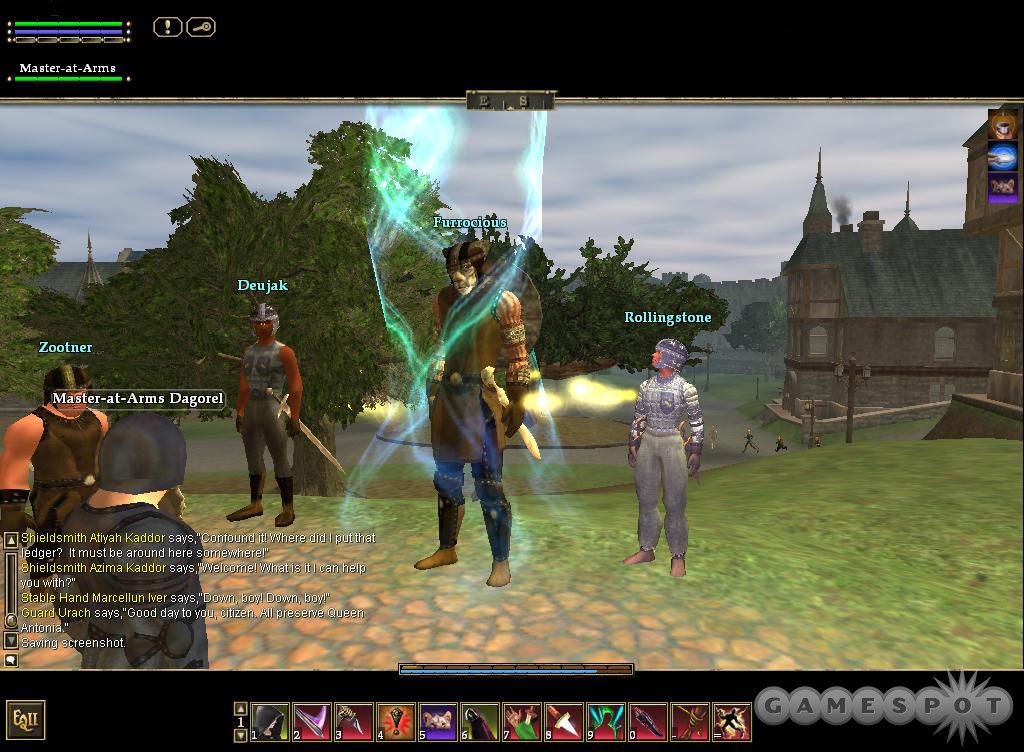
EverQuest II is clearly the product of an experienced committee of online RPG players and designers. It addresses many of the issues that arose during the course of the original EverQuest's lifetime, though, on a feature-for-feature basis, many of these solutions have previously appeared in similar games. As such, this game is yet another marginal step forward for the genre, insofar as it's in many ways slicker and easier to get into than most of its predecessors. Yet the question of whether it's worth your while is ultimately going to be a personal one, as this is still a time-consuming game that fundamentally delivers the same sort of thing that the genre has been providing since EverQuest fired it up in 1999. So if you've given up on games like this until some sort of revolutionary development, then EverQuest II probably won't have what it takes to reinvigorate your interest. But if you want a big new fantasy world to explore and find stuff and kill monsters in, ideally in the company of some friends, then EverQuest II has got it.
